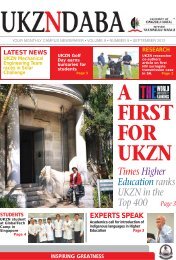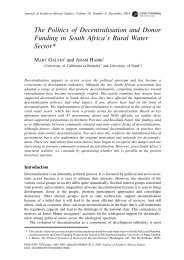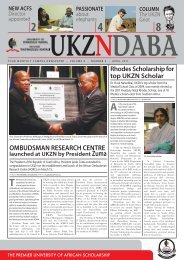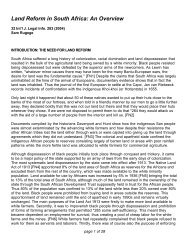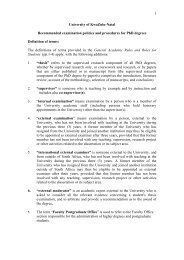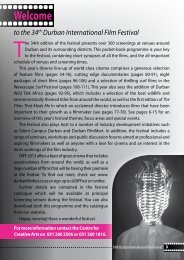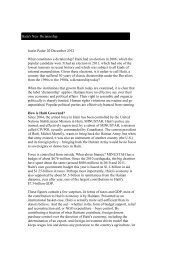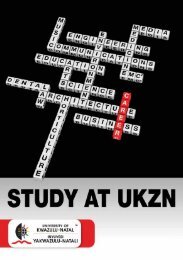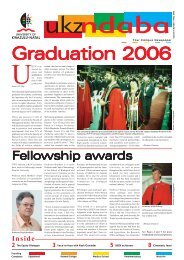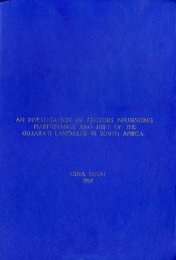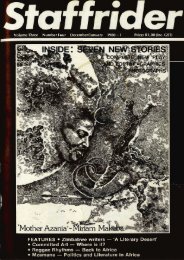Staffrider Vol.6 No.2 1985 - DISA
Staffrider Vol.6 No.2 1985 - DISA
Staffrider Vol.6 No.2 1985 - DISA
You also want an ePaper? Increase the reach of your titles
YUMPU automatically turns print PDFs into web optimized ePapers that Google loves.
silence between management and workers. Friday afternoonwe got paid, but we were suspicious when the pay trolleystarted at the last department instead of from the office asusual. Some people's packets were not in the trolley and theywere told to go to the office for their money. Mr Xala and Iaccompanied workers to see what was going on. The vicechairmanof the shop stewards had already accepted hispacket, which included his unemployment card. Twentytwowere dismissed.THE UNION STEPS INWe informed the union. The union rep came the next weekand Stood at the gate to see management block the 22 fromentering the premises. He went with them to collect their payand to check what papers they were given to sign. This wasOctober 1981.The union then went to the Industrial Council Court todemand reinstatement. The struggle was hot; some cowardswithdrew from the movement. The dismissed peoplecontinued to meet in the Morena office to hear what washappening in the factory, and with the Industrial Council.Inside the factory we put pressure on with a go-slow. We helda meeting with MAWU officials from Cape Town andPietermaritzburg and the surrounding areas to discuss theproblem and to encourage the workers in the struggle.When management tried to get us to work overtime tocover for the dismissed workers, most people refused butmanagement approached a few individuals who agreed. Thesepeople were confronted and beaten. They were forced tostay in the factory at night. They phoned the manager forhelp with transport, but he was no help to them — he justwent back to bed. Next day they all went home, but theywould be paid for the day. I asked Paul Derer if I could alsogo home to sleep and still get paid? He asked, 'Who beat theovertime workers?'Next day we all received the December bonus and thenthe company closed down for the holidays. During that timewe contacted lawyers to continue the case. When wereturned to work in January 1982 the management was stilltalking about overtime, but now no one tried to workovertime. Management was annoyed at the case and said if Iattended I would be fired. I attended the case and on the lastday the director took me back to the factory in his car.There was no discussion, only silence. As a result of the caseall the workers were re-instated with six weeks back pay forhalf the time they were out. When they returned on Mondaythe company refused to let them in, so Mayekiso and BernieFanaroff arrived to talk with management. They said thesepeople had been fighting and stealing food from the canteenand that they only had work for three workers. Mayekisoreported back to the 22 workers. They said they were notprepared to send only three back. They had all been firedat the same time for the same reason.We reported this to the Johannesburg office, who wentback to the lawyer. The company agreed to meet the unionwith Mayekiso and Fanaroff present. The management calledin the workers and each was sent to their previous jobs. Somewere not given back their jobs: Wanda Masemola — a driver —was employed as a gardener. Livingstone Nagoxo — aninspector — was made a clerk, and Gibson Xaba was movedfrom storekeeper to parts supplier. The 22 workers receivedtheir back pay and found that money had been deducted forthe pension fund for twelve weeks.MEETING AT MORENAAfter two or three days a general meeting was held at MorenaStore when we planned to go ahead with negotiations for arecognition agreement.Negotiations were tough. We met sometimes three timesa week with management for six months; each time there wasa deadlock. The Agreement was signed on 22 July. Most ofthe problems were over grievance procedure. By this time wewere also pushing for another increase, but managementwould not agree to two sets of negotiations at once.About this time management introduced the 'value arch',with two workers from each department meeting managementto plan the jobs.AN UGLY INCIDENTThere was also an ugly incident at this time. A group ofworkers who belonged to Steel, Engineering and AlliedWorkers Union went to management complaining ofintimidation by MAWU. The management called in the policeand these workers pointed out some of our members. Mostof the shop stewards were on a training course at theUniversity; only three were left in the factory. Two werearrested. The accused were called in to the office, told therewas something wrong with their pay packets, and then put inthe police van. The third, Enoch Khowane, suspected andrefused to go to the office — so the police came into thefactory to take him. Everyone stood up and followed thepolice. The police pulled him into the van and drove off. Theworkers refused to go back to work. Management phonedthe union to complain that workers were not working. Therest of the shop stewards returned; by this time the workershad gone. Management called the stewards into the officebut we refused to go.On Monday the Elsburg police went to the location andarrested more members, including Samuel Skhosane, PeterMdonsele and Selby Shabalala. The three arrested on Fridaywere released on R300 bail, after being charged under theIntimidation Act. Six people were arrested during the week,but the company had them released because of the pressureof the workers.WE ASKED FOR EXECUTIVE CARSFrom there we demanded that management give us transportto go and lay charges against the non-MAWU people — asmanagement had given them transport. We were offered atruck. We refused and asked for the executive cars. We weretaken up to the Elsburg police station in two Mercedes, twoGolfs, six Audis, and a Ford three litre. The stationcommander tried to get us to drop charges — but we wouldnot because he had accepted the earlier case. We returned inthe cars, with the station commander, to hold talks with thecompany to settle out of court.The company said they were not responsible for thearrests. We said they had provided the transport to the policestation. The commander said he was going to stop the case.We were given papers to sign to drop our case against theothers, but we refused. When the case came up — on 4 November1982 — it was dropped. All this disturbed negotiationswhich only resumed in January 1983. Then the directorresigned and we were told there could be no morenegotiations until his replacement arrived on 1 May.In 1981 we had received the Industrial Council increaseplus ten cents. In 1982 we just received the IndustrialCouncil increase. We kept pushing management and in March1983 got twenty cents plus a promise of ten cents to be paidin July (the starting rate was R1.58 at this time). We receivedthe extra ten cents in July for one week, then we were allfired. But before this they fired the man responsible for the'value arch'. Forty were retrenched, a technical manager, MrHome, was fired because he was on our side. On the twelfthSTAFFRIDER, VOL. 6 NO. 2, <strong>1985</strong> 15



